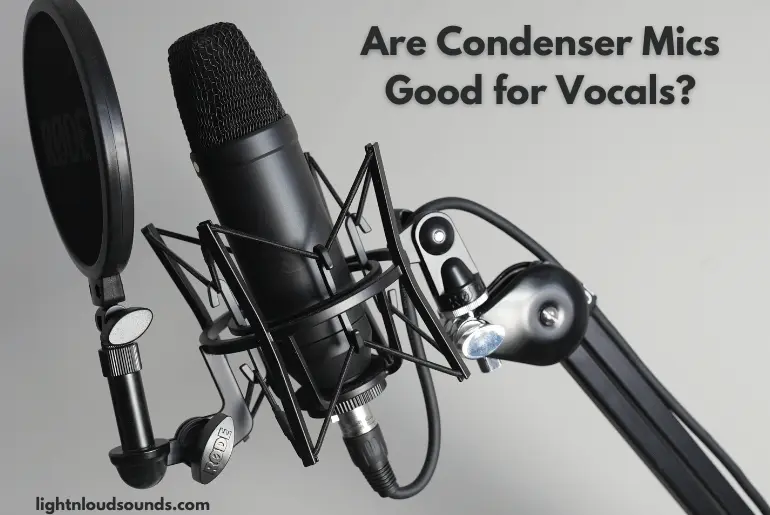Recording vocals is an art form that demands precision, clarity, and depth to capture the nuances of human emotion and pitch. One crucial element that can make or break the quality of vocal recording is the type of microphone used.
Among the various options available, condenser microphones are often touted as excellent for capturing vocals. But is this commonly held belief backed by technical merits, or is it merely a prevailing myth in the audio community?
In this post, we will delve into the specifications, advantages, and potential drawbacks of using condenser mics for vocals, aiming to provide a comprehensive overview that can guide your choice.
Post Contents
Are Condenser Mics Good for Vocals?
Condenser microphones are widely considered an excellent choice for recording vocals due to their inherent sensitivity and wide frequency response. These microphones contain a lightweight diaphragm close to a backplate, which allows them to capture sound waves with great fidelity. As a result, they produce a high level of detail, accurately reflecting the nuances of the human voice, such as breath sounds.
This makes condenser mics highly favored in studio settings where capturing vocal intricacies is a top priority. Their broad frequency response ensures that both low and high vocal ranges are reproduced clearly, making them versatile enough for various vocal types and styles.
Advantages of Using Condenser Mics
1. High Sensitivity and Detail
Condenser microphones are renowned for their high sensitivity and ability to capture subtle nuances in sound. The lightweight diaphragm responds rapidly to sound waves, making these microphones excellent for capturing the intricacies of vocal performances, acoustic instruments, and other sound sources that require a detailed reproduction. This makes them the go-to choice in many professional recording studios.
2. Wide Frequency Response
Another advantage of using a condenser microphone is its wide frequency response, which means it can accurately capture both the high and low ends of the sound spectrum. This is particularly useful for vocals, where capturing the full range of human emotion and intonation is critical. Whether it’s the warm, resonant lows or the crisp, clear highs, a condenser microphone can do it all.
3. Low Noise Floor
Condenser microphones generally have a low self-noise level, or “noise floor,” which means they produce less inherent noise during recording. This is essential when you’re aiming for high-quality recordings that require a clean, transparent sound. The low noise floor allows for better post-production work, giving you more freedom to manipulate the recorded audio without introducing unwanted noise.
4. Versatility

While condenser mics are excellent for capturing vocals, their capabilities don’t end there. They are highly versatile and can be used for a variety of applications, from recording musical instruments like pianos and string sections to capturing ambient sounds for film production. This multipurpose nature makes them a valuable addition to both professional and home studios.
5. Portability and Ease of Setup
Many modern condenser microphones come in USB varieties that are portable and easy to set up. Simply plug them into a computer, and they are ready to go, eliminating the need for an external audio interface or mixer in many cases. While these may not offer the same level of quality as high-end studio condenser mics, they still provide significantly better audio capture than built-in computer microphones or cheaper dynamic mics, making them suitable for podcasting, streaming, and basic recording needs.
Limitations of the Using Condenser Mics
1. Susceptibility to Ambient Noise
One of the downsides of using a condenser microphone’s high sensitivity is that it easily picks up ambient noise, room acoustics, and even subtle sounds like the humming of an air conditioner. This can be a significant issue if you’re recording in an environment that’s not soundproof or acoustically treated. You may end up capturing not just the vocals but also unwanted background noise, requiring additional time and effort in post-production to clean up the audio.
2. Phantom Power Requirements
Most condenser microphones require an external power source known as “phantom power” to charge their internal electronics. This requirement can be limiting if you’re recording in a setting without access to such power, like outdoor locations. It also means that your recording setup becomes more complex, as you’ll often need an audio interface or a mixer that can provide phantom power, adding to the overall cost and complexity of your recording system.
3. Less Robust and Durable
Condenser microphones are generally more fragile than their dynamic counterparts, making them less suited for high-pressure sound levels or physically demanding situations. For example, they are not ideal for capturing extremely loud sound sources like guitar amplifiers at high volumes or live performances where the mic could be dropped or mishandled. This lack of durability can be a significant drawback if you need a versatile microphone that can withstand a variety of recording conditions.
FAQ
Do singers use dynamic or condenser mics?
Both dynamic and condenser microphones are used by singers, but the choice often depends on the context and specific needs of the performance or recording. In studio settings, condenser microphones are generally preferred for their high sensitivity and wide frequency response. On the other hand, dynamic microphones are commonly used in live performance scenarios due to their robustness, ability to handle high sound pressure levels, and less sensitivity to ambient noise.
Conclusion
After examining the technical aspects, benefits, and limitations of condenser microphones, it is evident that they are indeed an excellent option for capturing vocals. Their sensitivity, broad frequency response, and ability to capture fine details make them ideal for a vocal performance that requires nuance and depth. While not without drawbacks, these issues can generally be mitigated with proper technique and adjustments. Therefore, if you’re pursuing high-quality vocal recordings, investing in a good condenser microphone would be a justified decision.

